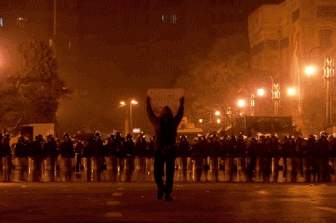By Michael Collins

Congress shall make no law respecting an establishment of religion, or prohibiting the free exercise thereof; or abridging the freedom of speech, or of the press; or the right of the people peaceably to assemble, and to petition the Government for a redress of grievances. Image: Cairo, January 2011
The people of Egypt have had enough of a failed dictatorship masquerading as a democracy. As events unfold, we're seeing a cautionary message entering the corporate media coverage of this event. Having never exposed the dire conditions that prompted the massive protests and demands for change, we're now told that this could negatively impact oil supplies, the stock market, and anti-terror efforts. No foundation for the claims was provided but they're repeated regularly on CNN, the NBC's, Fox, and the print media.
Thus, a false dilemma is created for the public: support the right of people to determine their own fate or protect your safety and the current standard of living, as it were.
Recent comments